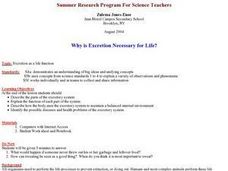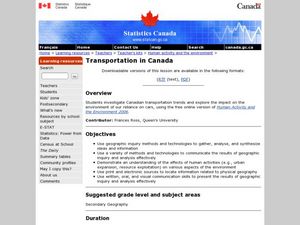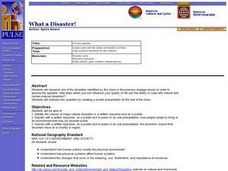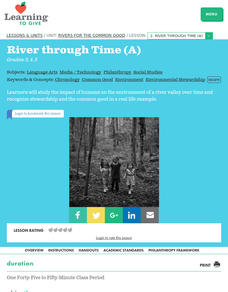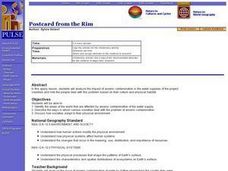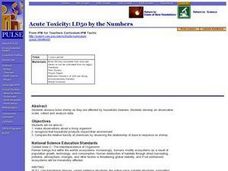Curated OER
Why is Excretion Necessary for Life?
Students describe and explain the function of each part of the excretory system. They discuss how the body uses the excretory system and identify diseases of the system.
Curated OER
One Grain at a Time
Young scholars investigate deserts. In this geography lesson, students create a KWL chart about deserts and research information on deserts by using reference books. Young scholars record the characteristics of deserts and the wildlife...
Curated OER
Pelicans in Peril
In this Gulf oil spill instructional activity, students examine an article regarding the brown pelican and the effects of the oil spill as well as a photograph.
Curated OER
Transportation in Canada
Students investigate the effect human activities have on the environment. In this geography lesson, students compose an article using data analysis about the environment. This article requires some homework assignment.
Curated OER
The Meaning of Genetic Variation
Students investigate variation in the beta globin gene by identifying base changes that do and do not alter function, and by using several Internet-based resources to consider the significance in different environments of the base...
Curated OER
Sunken Hazard
Pupils use information about past oil spills to predict potential effects of the Prestige spill on the environment, on marine life, and on the human culture and economy of Spain.
Curated OER
Design-a-Lesson-Packaging a Product
Students in a teacher education class address consumer related issues involving packaging. Using volume, surface area and graphs, they create a package for a given volume of a product. They design modifications for this lesson and to...
Curated OER
What a Disaster!
Pupils identify the causes of major natural disasters in a written response and on a poster. They explain with a written response, on a poster and to peers in an oral presentation, how people adapt to living in an environment that may be...
Curated OER
Environmental Education/Water Pollution
Fifth graders play a game in which they list as many environmental issues or terms in alphabetical order. They brainstorm ways they can save the environment and create a mural that displayed research found from the internet and Encarta.
Curated OER
Environmentalism: Then and Now
Tenth graders examine the history of the conservation movement and how it relates to contemporary issues. In this Environmental Science activity, 10th graders research the roots of the environmental and conservation movement and...
Curated OER
River through Time (A)
Students study the impact of humans on the environment of a river valley over time and recognize stewardship and the common good in a real life example.
Curated OER
Cumulative Effects Assessment - What if?
Tenth graders discuss natural and human influences that may affect the ecological integrity of national parks. They study the concepts environmental assessments. In groups, they research a park's situation and present their findings at a...
Curated OER
Peeled Trees Tell The Story
Students investigate the diversity of life that is found in Montana. They research some of the different interactions that organisms have with their environment. The lesson plan includes an extensive introduction for teacher information....
Curated OER
World Geography: Postcard from the Rim
Students are able to identify the areas of the world that are affected by arsenic contamination of the water supply. They are able to describe the ways in which various societies deal with the problem of arsenic contamination. ...
Curated OER
Outcomes Science 4: Earth & Beyond
In this earth and beyond science worksheet, students read through 11 pages of information on weather, global warming, climate change and other related topics. There are many website links on the pages that provide additional information...
Curated OER
pH Readings and Salinity Readings of Water From Three Locations Within the Neponset River Watershed
Sixth graders test the ph levels of water from three different water environments within the Neponset River Watershed. They discuss the three different water environments, take pH measurements of the three samples, and predict which...
Curated OER
This Stuff Makes Me Sick
Students participate in a lab showing the effects of pesticides on Lumbriculus variegatus. Several extensions and variations are also included in this lesson including one which relates the experiment to how pesticides enter our drinking...
Curated OER
Insect Biology and Ecology: A Primer
Pupils explore insects and closely related organisms. They examine the growth and development of a lady beetle. Students classify insects and organize them. They investigate pest management.
Curated OER
Exploring the Neighborhood -- Literature Jigsaw
Students compare and contrast domesticated animals and wild animals. They identify plants and animals that have adapted to different habitats. They discover it is everyone's responsibility to protect the environment.
Curated OER
Water Stories
Students interpret historical accounts, stories and customs to draw conclusions about the people who populated New Mexico and their relationship to water. They describe the human and natural characteristics of places in New Mexico.
Curated OER
Learning About Japan Through Its Kites--Intermediate
Students read various readings on two kit making sessions. They locate places and human spatial patterns using a map. Students design in two dimensions using line to create details.
Curated OER
Why Care About Amphibian Population Decline and Malformations?
Students examine the reasons for preserving wildlife. They look at reasons for amphibian malformations and write an essay about the ethical issues that this brings up. They listen to the teacher read quotes about extinction and how the...
Curated OER
Acute Toxicity: LD50 by the Numbers
Students observe brine shrimp as they are affected by household cleaners, develop observation scale, collect and analyze data, and discuss how household products and pesticides negatively impact environment.
Curated OER
Ecology and Life Interactions
Students discuss the hierarchy of an ecosystem. They are asked what are the optimum conditions that support human life? Students are asked what are their personal "optimum conditions" are. They are given the following as the question...


